
-
Trouvez l’alimentation idéale pour votre animalDécouvrez quelle alimentation correspond aux besoins spécifiques de votre animal.Trouvez l’alimentation idéale pour votre animalDécouvrez quelle alimentation correspond aux besoins spécifiques de votre animal.Produits recommandés
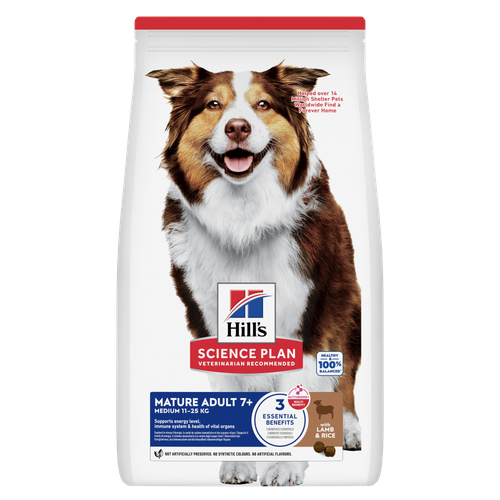 Mature - Croquettes pour Chien Mature - Moyenne Race
Mature - Croquettes pour Chien Mature - Moyenne RaceHill’s Science Plan Mature Adult - Croquettes pour Chien Mature à l’Agneau & Riz - Moyenne Race est un aliment complet spécialement formulé avec la technologie ActivBiome+ Multi-Benefit.
Cet aliment est spécialement formulé pour répondre aux besoins du chien vieillissant de moyenne race.Découvrir Performance - Croquettes pour Chien Adulte
Performance - Croquettes pour Chien AdulteHill’s Science Plan Performance - Croquettes pour Chien Adulte (1+) au Poulet est formulé pour répondre aux besoins énergétiques supplémentaires des chiens actifs, de travail et de chasse.
Découvrir Perfect Weight - Croquettes pour Chien Adulte (1+) - Grande Race
Perfect Weight - Croquettes pour Chien Adulte (1+) - Grande RaceHill’s Science Plan - Perfect Weight - Croquettes pour Chien - Grande Race au Poulet est un délicieux aliment cliniquement prouvé pour aider le chien à atteindre et maintenir un poids sain.
DécouvrirProduits recommandés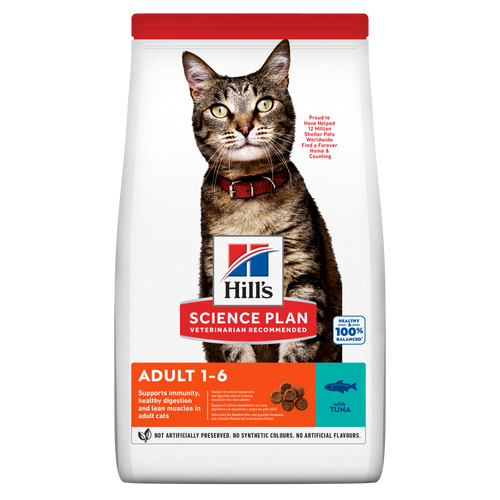 Croquettes pour Chat Adulte (1-6) - au Thon
Croquettes pour Chat Adulte (1-6) - au ThonHill’s Science Plan Adult - Croquettes pour Chat Adulte au Saumon est un aliment complet spécialement formulé avec la technologie ActivBiome+ Multi-Benefit.
Cet aliment est spécialement formulé pour répondre aux besoins énergétiques du chat pendant la période la plus active de sa vie.Découvrir Adult - Croquettes pour Chat Adulte
Adult - Croquettes pour Chat AdulteHill’s Science Plan Adult - Croquettes pour Chat Adulte au Poulet est un aliment complet spécialement formulé avec la technologie ActivBiome+ Multi-Benefit.
Cet aliment est spécialement formulé pour répondre aux besoins énergétiques du chat pendant la période la plus active de sa vie.Découvrir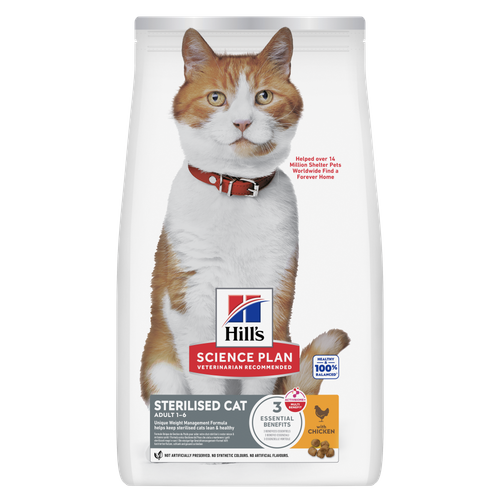 Sterilised Cat - Croquettes pour Chat Adulte Stérilisé
Sterilised Cat - Croquettes pour Chat Adulte StériliséHill’s Science Plan Adult Sterilised - Croquettes pour Chat Adulte au Poulet est un aliment spécialement formulé avec la technologie ActivBiome+ Multi-Benefit. Il s’agit d’un aliment équilibré, formulé pour répondre aux besoins du chat stérilisé, afin de l’aider à maintenir son poids de forme et à rester en bonne santé.
Découvrir -
Pour chienPour chatArticles à la une
 Démangeaisons chez l’animal : causes fréquentes
Démangeaisons chez l’animal : causes fréquentesSi votre chat ou votre chien se gratte constamment, cela peut être très pénible tant pour vous que pour lui. Découvrez ce qui peut en être la cause.
En savoir plus Constipation chez le chien et le chat
Constipation chez le chien et le chatDécouvrez les causes possibles de la constipation chez le chat et le chien et comment vous pouvez aider votre animal.
En savoir plus Variations de poids chez le chien et le chat : pourrait-il s’agir du diabète ?
Variations de poids chez le chien et le chat : pourrait-il s’agir du diabète ?Le diabète est une maladie dans laquelle le taux de sucre dans le sang (glycémie) est trop élevé. Il peut entraîner une prise ou une perte de poids chez le chat ou le chien.
En savoir plus -
Le stress chez le chat
Le stress chez le chat
Quelles sont les causes de stress chez le chat ?
Tandis que les troubles gastro-intestinaux et urinaires sont visibles, le chat peut également être stressé, mais le cacher. Plusieurs facteurs peuvent être à l’origine de stress chez le chat.
- Changement dans le foyer
- Changement(s) dans leur routine
- Ennui
Si vous pensez que votre chat est stressé, surveillez son comportement et notez tout changement afin d’en discuter avec votre vétérinaire.
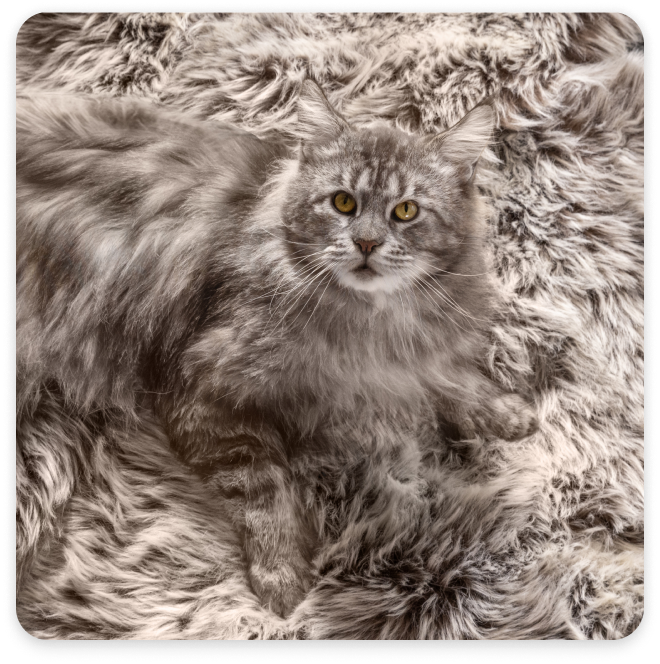
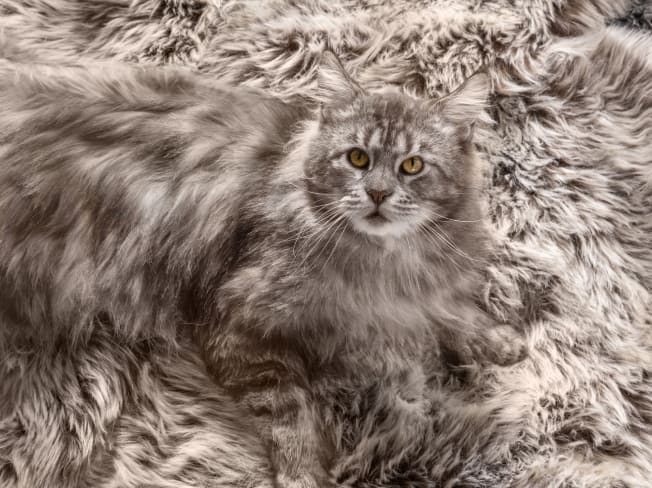
Quels sont les signes cachés de stress ?
Même lorsque les signes sont visibles, il n'est pas évident de se rendre compte qu’un animal est stressé. Comme les signes urinaires sont les signes de stress cachés les plus visibles, vous vous demandez peut-être si votre chat urine à cause du stress ou si le stress peut provoquer des troubles urinaires. Si vous remarquez un ou plusieurs de ces signes, il est important de prendre rendez-vous chez votre vétérinaire.






Gestion du stress de l’animal
Si vous pensez que votre chat est stressé, la première chose à faire est de consulter votre vétérinaire. Celui-ci pourra vous fournir des conseils et des informations sur la gestion du stress chez votre chat. Il pourra également recommander une alimentation adaptée ou un traitement pour soulager certains signes associés au stress, comme la diarrhée et les accidents urinaires.
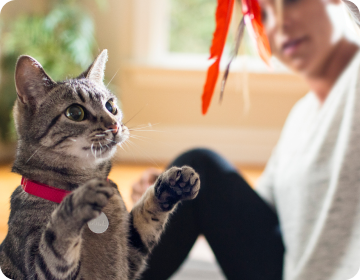

À la maison
Le fait d’établir des habitudes avec votre chat peut contribuer à réduire son stress. Voici quelques conseils pour aider votre chat à ne pas être stressé :
- Les bacs à litière doivent toujours être propres et le chat doit toujours avoir de l’eau fraîche à disposition. Ne pas oublier d’éloigner le bac à litière de l’alimentation.
- Dans les foyers où il y a plusieurs chats, prévoir suffisamment de nourriture, d’eau et de bacs à litière pour chaque chat.
- Créer une aire de jeux pour que le chat puisse s’amuser et pour qu’il puisse satisfaire son besoin de faire ses griffes.
- Faire attention au langage corporel du chat avant de le toucher ou de le manipuler.
- Comme le chat adore grimper en hauteur, lui installer une chaise devant une fenêtre pour qu’il puisse observer le monde extérieur.
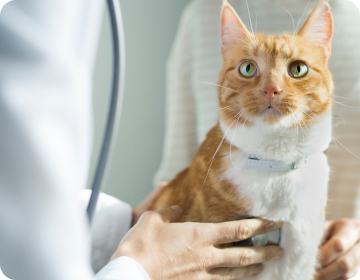

Médicaments
Outre les adaptations comportementales et environnementales, votre vétérinaire prescrira peut-être des médicaments pour aider à gérer le stress de votre chat. Si vous souhaitez administrer des médicaments à votre chat, consultez d’abord votre vétérinaire. Les médicaments en vente libre ne doivent être utilisés que sur recommandation du vétérinaire.
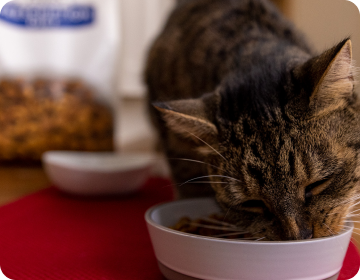

Alimentation
Si elle est bien équilibrée, l’alimentation de votre chat peut contribuer à gérer les signes de déséquilibre émotionnel. Demandez à votre vétérinaire de vous recommander une alimentation pouvant aider à gérer les signes de stress afin d’améliorer la qualité de vie de votre chat.
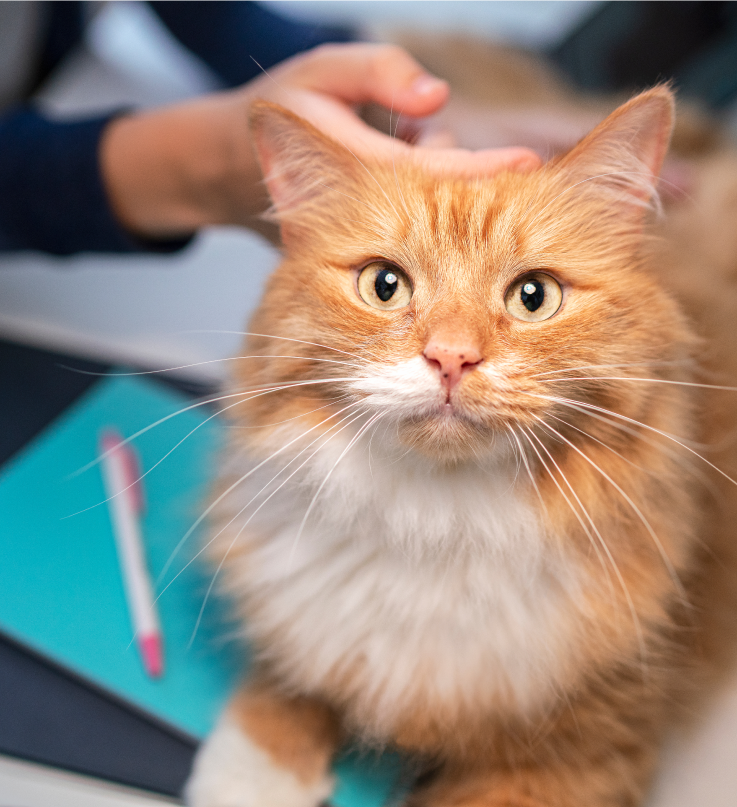

Trouver la bonne alimentation pour aider à gérer l’équilibre émotionnel
Dans le cadre d’un plan de traitement complet pour aider à gérer le stress d’un chat, votre vétérinaire peut recommander une alimentation clinique. Un mélange d’ingrédients approprié peut faire toute la différence chez les animaux stressés.
Quels sont les ingrédients qui permettent de contrôler le stress ?
- Le L-tryptophane est un ingrédient qui peut aider à soutenir l'équilibre émotionnel [1,2]
- L’hydrolysat de protéines de lait diminue la peur et augmente la sociabilité [3]
- Les acides gras Oméga-3 et les antioxydants contribuent à une bonne réponse de l'organisme au stress
[3] Beata et al. J Vet Behavior 2007;2:40-46.
Demandez des recommandations à votre vétérinaire
Les aliments Hill’s Prescription Diet offrent une nutrition clinique pour diverses affections. Ils sont testés cliniquement et développés par une équipe de nutritionnistes et de vétérinaires. Vous pouvez donc être certain(e) que votre animal bénéficie d’une nutrition de qualité supérieure fondée sur la science.
Prenez rendez-vous chez votre vétérinaire et demandez-lui dans quelle mesure Hill’s Pet Nutrition peut être bénéfique.
Demandez des recommandations à votre vétérinaire
Les aliments Hill’s Prescription Diet offrent une nutrition clinique pour diverses affections. Ils sont testés cliniquement et développés par une équipe de nutritionnistes et de vétérinaires. Vous pouvez donc être certain(e) que votre animal bénéficie d’une nutrition de qualité supérieure fondée sur la science.
Prenez rendez-vous chez votre vétérinaire et demandez-lui dans quelle mesure Hill’s Pet Nutrition peut être bénéfique.
Aliments recommandés pour les chiens sujets au stress
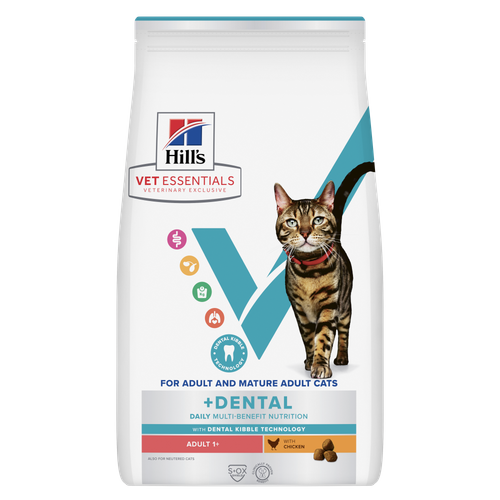
Hill's VET ESSENTIALS MULTI-BENEFIT + DENTAL Croquettes pour chat au Poulet (pour chats adultes et adultes matures âgés de 1 an et plus) est un aliment complet aux bénéfices multiples disponible exclusivement chez votre vétérinaire. Formulé avec une technologie de croquettes bucco-dentaires cliniquement prouvée pour réduire la formation de la plaque dentaire et du tartre lors de la mastication, pour des dents et gencives saines. Pour un meilleur quotidien, aujourd'hui et demain.
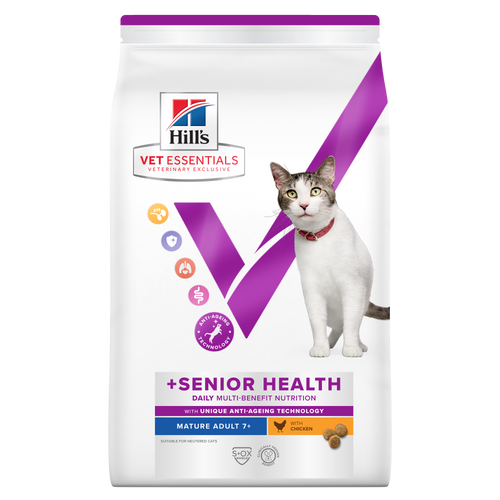
Les croquettes Hill's Vet Essentials Multi-Benefit +Senior Health au Poulet pour Chats Adultes Matures âgés de plus de 7 ans est la formule Hill's la plus avancée, disponible exclusivement en clinique vétérinaire. Conçues pour améliorer leur qualité de vie, elles fournissent une nutrition complète et multi-bénéfices formulée pour soutenir la santé cérébrale et la vitalité de votre chat avec un mélange anti-âge unique, ainsi que pour soutenir son système immunitaire et la santé de ses articulations. Une nutrition savoureuse - pour un meilleur quotidien, aujourd'hui et demain.
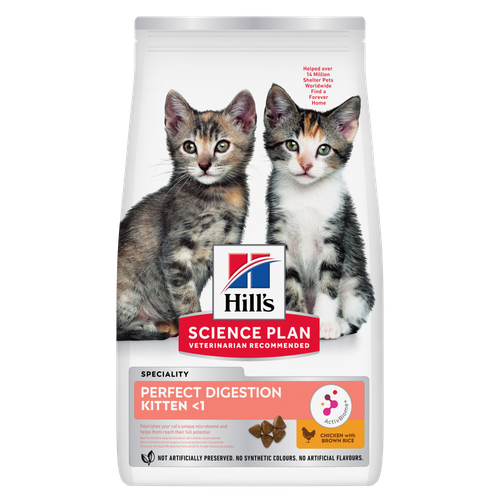
Hill’s Science Plan - Perfect Digestion - Croquettes pour Chaton au Poulet et Riz Complet nourrit le microbiome unique de votre chaton et l’aide à atteindre son plein potentiel.

Hill's VET ESSENTIALS MULTI-BENEFIT Bouchées en sauce au Poulet cuit lentement (aliment humide pour chat adulte mature de 7 ans et +) est une nutrition disponible exclusivement chez les vétérinaires, aux bénéfices multiples cliniquement prouvés pour soutenir la digestion et le bien-être.Formulé avec des protéines de haute qualité pour soutenir la santé musculaire et une teneur contrôlée en minéraux pour la bonne santé des organes vitaux. — Un goût délicieux, pour un meilleur quotidien, aujourd'hui et demain.
Avec des bénéfices nutritionnels comparables à ceux de nos croquettes, l'alimentation humide peut aider à augmenter la consommation d'eau de votre animal et est un excellent moyen de satisfaire le besoin de variété de votre chat, avec de nombreuses façons de mélanger les croquettes et la pâtée.

